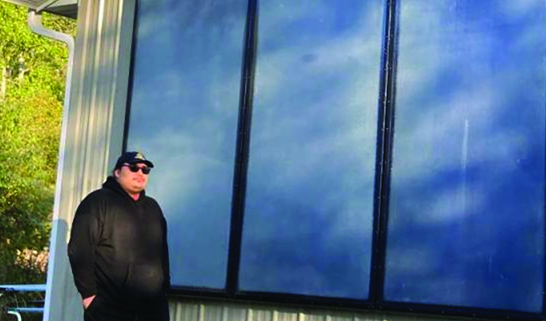By Emily Haeg Nguyen
Heating accounts for the majority of energy used in an average U.S. household. The cost of this heat, especially in many of Minnesota’s tribal and rural communities, can be a serious burden.
“There’s a dilemma for people on the reservation that we call, ‘heat vs eat.’ Are they gonna pay for propane to keep themselves warm or are they going to pay for groceries?” says Gwe Gasco, Marketing and Sales Director at 8th Fire Solar.
8th Fire Solar is a solar thermal business located on the White Earth Reservation in Northwestern Minnesota. The business primarily manufactures and installs thermal solar systems on privately owned properties. They also take part in grant-funded installations in low-income communities.
The use of solar thermal technology reduces the need for other forms of heating which are typically fossil fuel based. Solar thermal panels can supplement as much as 20-40% of typical heating needs.
“No matter how many late fees and invoices that you have, you’re never gonna get a past due bill from the sun, right?” says Gasco.
As a Native-run organization, they hope their sustainable and renewable energy product can help build a better future for everyone, especially Native American communities.
“This is an economic and reliable energy choice that helps lower bills and reduces our reliance on fossil fuels,” says Gasco. “So it’s nice to be able to show people that there’s another way to do things. And at the same time, we’re also kind of creating a tribal workforce.”
“I liked the idea of solar power,” recalls Gwe Gasco, thinking back on his life before the start of his career. “Where I’m situated on the reservation, there aren’t a lot of opportunities. So when I got out of high school, I thought 8th Fire Solar could be a cool thing to get into,” he says.
Gasco is an Ojibwe Odawa descendant from the White Earth Tribal Nation and the Little Traverse Bay Bands. He’s proud to live and work on White Earth, the same reservation where he was raised.
“I grew up running around the woods and swimming all day. You can’t really beat that as a kid,’ recalls Gasco. “I think that’s why I’ve always had that…I don’t know if I would call it ‘a love’ or ‘an understanding,’ or just ‘a connection’? But I’m very fond of the area and its resources.”
During high school, things shifted. Gasco attended several high schools and had trouble staying settled. After completing school, he took on odd jobs and struggled to find his path forward. However, things changed five years ago when he joined 8th Fire Solar. The move launched his career into a new trajectory. He’s since worked his way through the company, mastering various roles – from labor to office work.
“It’s been an experience!” says Gasco with a laugh. “I didn’t have any background working with anything solar, electric stuff, or even power tools! My mom raised me traditionally. She taught me about maple sugar harvesting and wild rice harvesting, traditional Ojibwe ways. So it’s been kind of cool to learn all these different skills, trades and techniques.”
Gasco says he’s grateful not only for his career, but the chance to help ignite others’ careers. Looking to spread the knowledge, 8th Fire Solar has started partnering with other tribes to host solar panel installation training sessions.
“This is a great technology, and I don’t think any one person should just have it to themselves,” says Gasco. “It should be made accessible to whoever needs it.”
Passing the torch
On a sunny day in Redwood County, two communities joined together. Gasco and the Northwest Minnesota based 8th Fire Solar team made the trek to the Lower Sioux Indian Community in Southwestern Minnesota. 8th Fire Solar led the group from Lower Sioux in classroom training on solar thermal installation. After, the groups teamed up to install solar furnaces on two separate family homes on the Lower Sioux Reservation. Labor funds for this cross-community training come from a CERTs Seed Grant.
“We knew that Lower Sioux was doing innovative work with hempcrete construction. The solar thermal work seemed like more Indigenous innovation that they would be interested in. They were! ” says Joel Haskard, CERTs’ Co-Director. “Later, we were also able to help provide some resources to do a similar cross-community training between the 8th Fire crew and a Leech Lake Band of Ojibwe cohort of future installers.”
“Working with CERTs on the workforce development piece has been great. Where there’s not many job opportunities, we can do the training. Then they have a trained workforce. The tribal members can branch out to do more installations and sort of make their own little micro-economy.” said Gwe Gasco
Looking to deepen the impact of this work, the University of Minnesota Extension Regional Sustainable Development Partnerships (RSDPs) have also tapped in. Northwest RSDP is currently working in partnership with 8th Fire Solar to develop a series of educational videos that will help train new installers. 8th Fire Solar hopes that more well-trained installers will lead to fewer homes without affordable heat.
“At the end of the day, we want to provide sustainable, efficient heat to low income tribal communities,” says Gasco. “We want to help people feel comfortable and safe. That’s what space heat does. That’s what makes a house a home, isn’t it?”
To learn more about CERT, see: https://www.cleanenergyresourceteams.org







